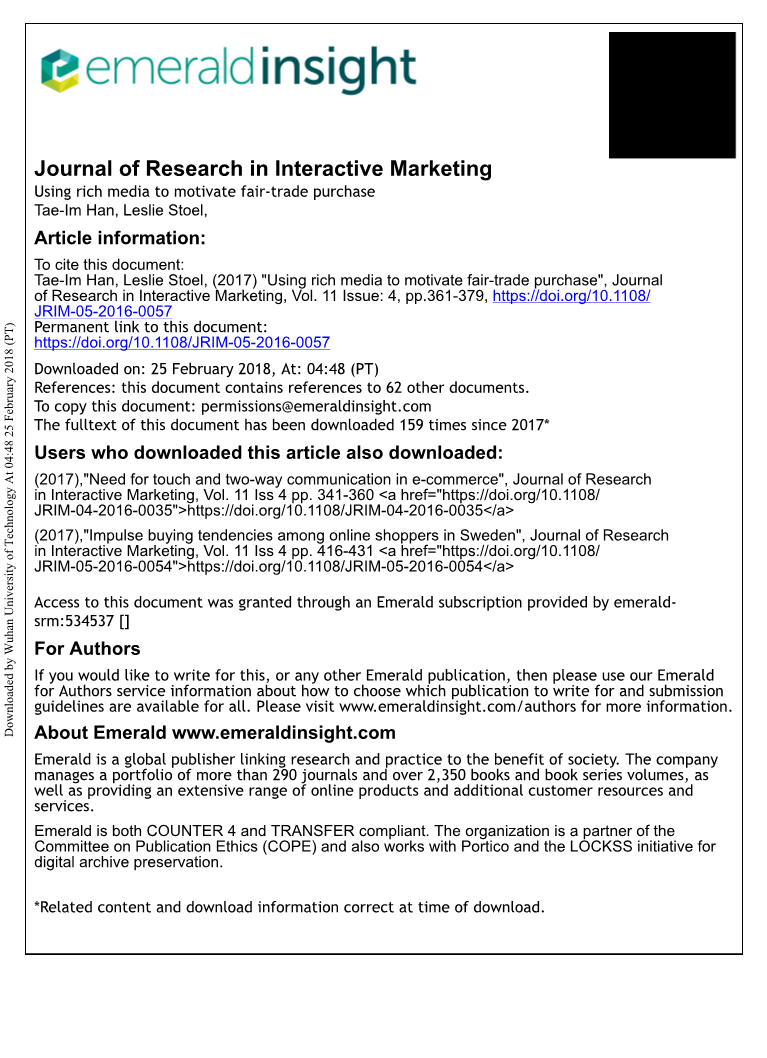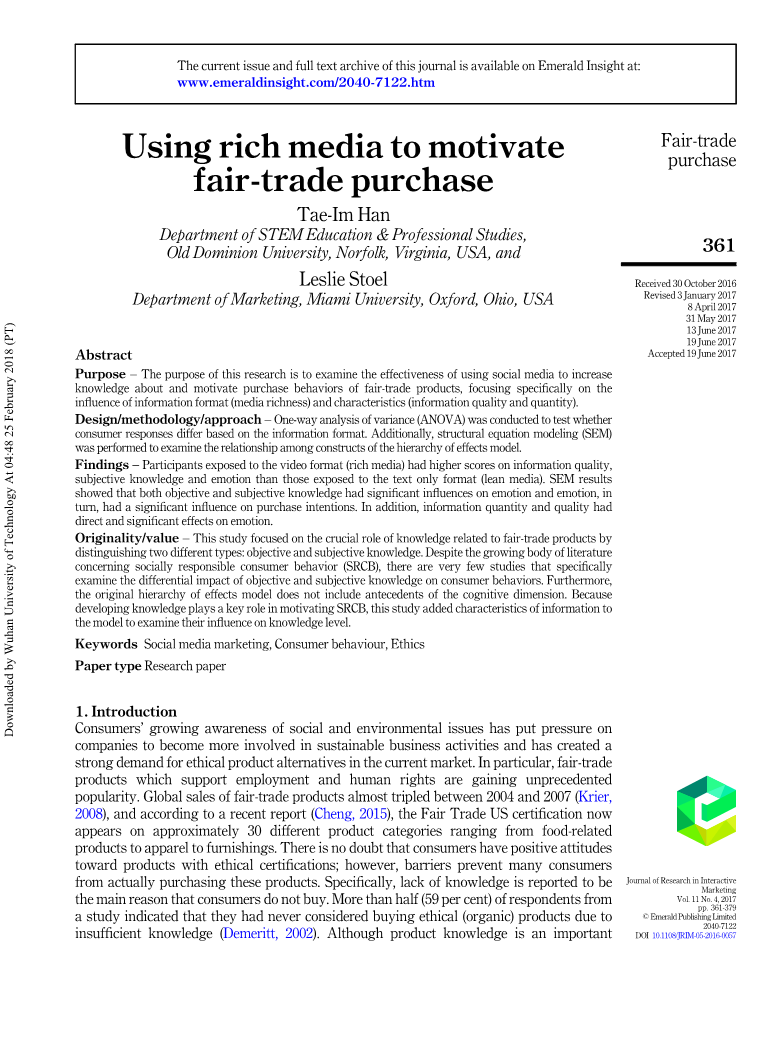

英语原文共 20 页,剩余内容已隐藏,支付完成后下载完整资料
Using rich media to motivate fair-trade purchase
Tae-Im Han
Department of STEM Education amp; Professional Studies, Old Dominion University, Norfolk, Virginia, USA, and
Leslie Stoel
Department of Marketing, Miami University, Oxford, Ohio, USA
Abstract
Purpose – The purpose of this research is to examine the effectiveness of using social media to increase knowledge about and motivate purchase behaviors of fair-trade products, focusing specifically on the influence of information format (media richness) and characteristics (information quality and quantity).
Design/methodology/approach – One-way analysis of variance (ANOVA) was conducted to test whether consumer responses differ based on the information format. Additionally, structural equation modeling (SEM) was performed to examine the relationship among constructs of the hierarchy of effects model.
Findings – Participants exposed to the video format (rich media) had higher scores on information quality, subjective knowledge and emotion than those exposed to the text only format (lean media). SEM results showed that both objective and subjective knowledge had significant influences on emotion and emotion, in turn, had a significant influence on purchase intentions. In addition, information quantity and quality had direct and significant effects on emotion.
Originality/value – This study focused on the crucial role of knowledge related to fair-trade products by distinguishing two different types: objective and subjective knowledge. Despite the growing body of literature concerning socially responsible consumer behavior (SRCB), there are very few studies that specifically examine the differential impact of objective and subjective knowledge on consumer behaviors. Furthermore, the original hierarchy of effects model does not include antecedents of the cognitive dimension. Because developing knowledge plays a key role in motivating SRCB, this study added characteristics of information to the model to examine their influence on knowledge level.
Keywords Social media marketing, Consumer behaviour, Ethics
Paper type Research paper
摘要
目的 :本研究的目的是验证利用社交媒体增加对公平贸易产品购买行为的认识和激励的有效性,重点在于信息格式(媒体丰富性)和信息特征(信息质量和数量)的影响 。
设计/方法/路径 :用方差分析法(ANOVA)以分析消费者对不同信息格式的反应。另外,用结构方程模型(SEM)验证模型的层次结构。
结论 :相比于单一的文本信息(乏媒体),参与者从视频信息(富媒体)中对信息质量,主观知识和情感有着更高的评分。 SEM结果显示客观知识和主观知识对情绪和情感有显著影响,反过来又对购买意愿有显著影响。另外,信息数量和信息质量对情绪有直接而显著的影响。
原创性/价值 :本研究侧重于区分两种不同类型的公平贸易产品的关键作用:客观知识和主观知识。尽管有关社会责任消费者行为(SRCB)的文献越来越多,但很少有研究专门研究客观知识和主观知识对消费者行为的差异影响。此外,原来的层次结果效应模型不包括认知维度前提。因为发展知识在激励SRCB方面起着关键作用,本研究为模型添加了信息特征,去检验它们对知识水平的影响。
关键词:社交媒体营销,消费者行为,道德
论文类型:研究论文
1.Introduction
Consumersrsquo; growing awareness of social and environmental issues has put pressure on companies to become more involved in sustainable business activities and has created a strong demand for ethical product alternatives in the current market. In particular, fair-trade products which support employment and human rights are gaining unprecedented popularity. Global sales of fair-trade products almost tripled between 2004 and 2007 (Krier, 2008), and according to a recent report (Cheng, 2015), the Fair Trade US certification now appears on approximately 30 different product categories ranging from food-related products to apparel to furnishings. There is no doubt that consumers have positive attitudes toward products with ethical certifications; however, barriers prevent many consumers from actually purchasing these products. Specifically, lack of knowledge is reported to be the main reason that consumers do not buy. More than half (59 per cent) of respondents from a study indicated that they had never considered buying ethical (organic) products due to insufficient knowledge (Demeritt, 2002). Although product knowledge is an important determinant of consumer behaviors, the extant literature provides very limited empirical evidence regarding how it influences consumers in the domain of ethical consumption. To enable fair-trade goods to make a positive impact on mainstream industry, similar to that of organic products, these goods need to appeal to a wider market audience (Cheng, 2015). One way of achieving this goal would be to increase knowledge about fair-trade products among consumers to stimulate sales in the market.
一,前言
消费者对社会和环境问题意识增长,迫使企业加大可持续商业活动的力度,并在当前市场上创造了对道德产品的强烈需求。特别是那些支持就业和人权的公平贸易产品正获得前所未有的声望。公平贸易产品的全球销售额在2004年至2007年间增长了近三倍(Krier,2008),根据最近的一份报告(Cheng,2015),现在公平贸易美国证书里面大约有30种不同的产品类别,从食品相关产品到服装到家具。毫无疑问,消费者对具有道德认证的产品有积极的态度;然而,存在障碍阻止了很多消费者实际购买这些产品。具体而言,缺乏知识据报道是消费者不买这些产品的主要原因。一项研究中超过半数(59%)的受访者表示,由于知识不足,他们从未考虑购买道德(有机)产品(Demeritt,2002)。虽然产品知识是消费者行为的重要决定因素,但现存文献却提供了非常有限的经验证据,关于产品知识如何影响消费者在道德领域的消费。为了使公平贸易产品类似于有机产品对主流产业产生积极影响,这些产品需要吸引更多的市场观众(Cheng,2015)。实现这一目标的一种方法是增加消费者对公平贸易产品的了解,以刺激市场销售。
Social media may be an effective marketing tool to educate and motivate socially responsible consumer behavior (SRCB) because it provides an interactive platform through which businesses and consumers can easily communicate with many others (Wang et al., 2012). Previous studies on ethical human behaviors emphasize the influence of relevant others, such as peers in effectively changing onersquo;s own behavior (Goldstein et al., 2008; Kim et al., 2012; White et al., 2009). The visibility of othersrsquo; opinions and behaviors regarding ethical consumption significantly influences an individualrsquo;s buying behaviors. One common feature of popular social media websites is that there are various information formats that can be used to present knowledge-building messages to the public. Common representative formats include v
全文共74026字,剩余内容已隐藏,支付完成后下载完整资料
资料编号:[9982],资料为PDF文档或Word文档,PDF文档可免费转换为Word


